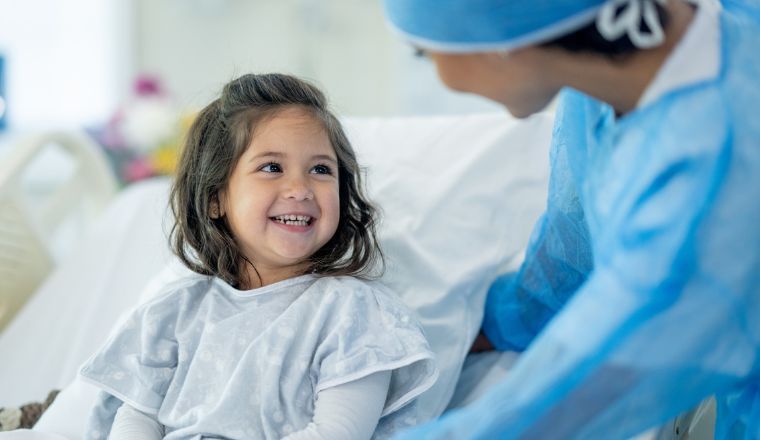About our child urology services
Our Paediatric Urology Team (team) at John Hunter Children's Hospital provide care to children with complex and common paediatric urological conditions.
Specialist care looks at issues with their bladder, kidneys or external genital area. Common urological conditions include bedwetting and urinary tract infections.
We work closely with the following medical services and units:
- General surgical service
- Paediatric rehabilitation service (for faecal (stools) incontinence or soiling)
- Maternal-foetal medicine unit at John Hunter Hospital
- Adult urology service at John Hunter Hospital
Who we see
We see children up to 16-years-of-age who have:
- structural problems with their bladder or kidneys. These problems may have been noticed before they were born, or when they were born.
- abnormal ultrasounds of the bladder or kidneys.
- abnormalities of the penis, testes and external genitals.
- leakage of urine in the day (day wetting) in children aged more than 4 years.
- leakage of urine (bedwetting) in children aged more than 6 years.
- repeated urinary infections with lower urinary tract symptoms.
- rare tumours and abnormalities of the urinary tract.
What we do
- Use a small camera to look inside the urinary tract (cystoscopy) to get information that helps treat your child.
- Open and keyhole surgery.
- Tests for urine leakage.
- Support for children who need clean intermittent catheterisation.
- Provide help with bed wetting alarms.
- Advice, support and counselling for parents and children who have urinary leakage.
Paediatric urology surgery
Urology surgery addresses several urological conditions from congenital (from birth) to acquired complications (developed over time).
Techniques like laparoscopic and robotic surgery are often used to reduce recovery and minimise pain. We also work with other health specialist services like endocrinology and psychology to provide integrated care.
Common urological conditions treated with surgery include:
- Bladder exstrophy - a congenital condition where the bladder is exposed outside the body.
- Hypospadias - a birth defect where the opening of the urethra is not located at the tip of the penis
- Undescended testicles - where one or both testicles do not move into the scrotum before birth.
- Vesicoureteral reflux - where urine flows backward from the bladder to the kidneys.
Referrals
You will need a referral for this service. Your GP (General Practitioner) can make a referral to the Paediatric Urology Service.
Preparing your child for surgery
Parents can help prepare their child for surgery and ease the process for them. You can:
- Explain the procedure - use simple age-appropriate language to explain what will happen. Books or videos designed for children about hospital visits can be helpful. Find more information in our Patients, carers and visitors' hub.
- Visit the hospital before surgery - arrange for a visit to the hospital before your child's surgery. This can help them get to know the environment, meet some of the staff and be more comfortable.
- Role-play - encourage role-play with toys to help your child understand the process, it can help make the experience less scary.
- Be positive - be calm and positive, your child will take cues from your emotions.
- Comfort items - let your child bring a favourite toy, blanket or item to the hospital for comfort.
- Follow pre-surgery instructions - guide your child to follow any pre-surgery instructions (like fasting) to avoid complications.
What happens before and after surgery
Before surgery
- Follow all the required pre-surgery instructions before arriving at the hospital.
- Parents bring their children for surgery to Ward J2 (Day stay) at John Hunter Children's Hospital.
- The nursing team will meet and prepare your child for surgery, including being admitted, weighed and given medications, as needed.
- The surgical team will meet with you and your child to:
- check that consent has been recorded and received.
- check that the surgical site is marked, as needed.
- answer any questions you may have.
- The anaesthetic team will make sure your child is ready for the anaesthetic and talk about recovery from the anaesthetic and pain relief.
- One parent is allowed to be with the child in the anaesthetic room while being anaesthetised.
- You will be shown where to wait outside the operating theatre. The surgical team will meet you here after completing the surgery.
Note: To reduce the risk of infection, we will ask all parents and visitors to wash and sanitise their hands every time they enter the wards.
After surgery
- Your child will be taken to the recovery ward. One parent can join before going back to the day stay ward (J2), or if staying overnight, in ward J1 or J2.
- Once recovery is complete, your nurse will discharge your child with the required post-surgery information, including:
- incision (surgical cut) care
- pain relief
- medications
- follow-up appointments.
Paediatric Continence Service
Hunter New England LHD also offers a Paediatric Continence Service (PCS) to help children with long standing continence issues. They conduct specialist assessments and reviews.
To access this service, your child must:
- be aged 3-16 years
- live within the Greater Newcastle area
- have initially been treated by their GP (General Practitioner), which has been unsuccessful after 3-6 months.
You will need a medical referral from your GP to access our service. Please use our Paediatric Continence Service referral form.
Please make sure the referral includes:
- detailed information regarding treatment provided so far.
- any pre-existing conditions that could affect the treatment plan (example: ASD/ADHD).
- tests completed relating to the continence issue.
- outline of the GP's treatment plan to date.
For more information call 0419 211 518 to speak with a PCS Nurse or email HNELHD-PaedContSrv@health.nsw.gov.au
For more information and support go to child and family health nursing service.
Contact Hunter New England LHD
We welcome your questions, feedback, compliments, and information requests. Contact us, and we'll be happy to assist you. Your input is important to us.
